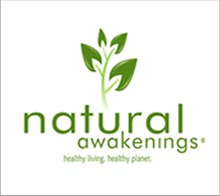We present - Our Interview with Natural Awakenings An Interview with Chris Baliko of Growing Solutions Tell us a little bit about your company and its foundation. Growing Solutions, LLC is a full service landscape company servicing Fairfield County since 2002. It is co-owned by Paul Fujitani and Chris Baliko. We began questioning some of the conventional practices and uses of chemicals in the landscape. In an effort to provide safer environments for our clients, our employees, and ourselves, we became Accredited Organic Land Care Professionals in 2006 and provide organic services such as sustainable landscape design, organic lawn and plant health care programs, and organic tick control. What are some of the services your company provides? We offer landscape design/installation, organic lawn and plant care, masonry, complete property maintenance, large tree care, and irrigation & lighting services. What are some common landscaping/gardening practices you can think of, off the top of your head, that are harmful to the environment and how? The common landscaping/gardening practices that are detrimental to the environment are the use and overuse of synthetic fertilizers and chemicals. Healthy soil is full of beneficial microbes- bacteria, fungi, and nematodes, all of which help make up the soil food web. They help break down the organic matter in the soil which releases nutrients into a form that is available to the lawn or plants. When synthetics are applied to the soil, they tend to kill off these microorganisms. As these microbes are reduced in the soil, the organic matter is not broken down as efficiently, thus reducing the nutrients available to the plants. It is then up to us to apply more fertilizer. As we apply more fertilizer we kill more microbes. This cycle continues until we end up with a ‘dead soil’. What we as landscapers and gardeners need to understand is that our focus should be on having a healthy soil. If we have a healthy soil, generally, you will have healthy plants. Another issue with applying more fertilizers is that much of it ends up as runoff and pollutes our waterways. Location, Location, Location! So many times we see plants struggling to survive simply because they are in the wrong spot- it’s too sunny, or shady, or there is not enough drainage, or it’s too dry. What do you suggest in order to make these practices more eco-friendly? Before applying any fertilizer, a soil test should be taken and the results analyzed to determine what the soil needs are. Take steps to amend the soil with compost which is full of beneficial microbes. Use organic fertilizers that have lower levels of nutrients and are broken down by the soil biology at a slower rate, thus releasing these nutrients over a longer period of time, which also reduces runoff issues. Right Plant, Right Place. Be sure to research a plant’s needs and optimum growing environment. They will be healthier and less susceptible to insect damage. They will also need less fertilizer and watering, which means overall, the maintenance is lower. What is the first thing you do when attempting to make a landscape more eco-friendly? The first step to making landscapes more eco-friendly is to study the soil. A soil test should be taken to determine what amendments need to be added to improve the soil. This is the basic building block to having a thick, healthy lawn or a garden that thrives. Why should someone pursue organic lawncare? Is it more expensive? Homeowners should pursue organic lawn care so they can create healthier environments for their families and pets, to reduce the runoff of chemicals and synthetic fertilizers into our waterways, and reduce their overall maintenance of their landscape. Typically, an organic lawn care program is requires more of an initial investment, but over time the cost tends to decrease once the soil biology has been built up and the need for fertilizer and water decreases. Do you have any interesting statistics about the environment when it comes to landscaping and gardening? There are over 40 million acres of turf in the United States and we use over 3 million tons of fertilizer and 30 thousand tons of synthetic pesticides each year to help maintain it. Homeowners can reduce the amount of fertilizer applied to their lawns by 50% by simply leaving the lawn clippings and allowing the microbes in the soil to break them down. Any other tips you can offer to someone who is looking to make their lawn or garden more eco-friendly? Some additional tips would be to think of your landscape as an eco-system. Encourage more native plant species on your property, be aware of invasive plants and animals and remove them if possible, and preserve existing plants that attract native fauna and beneficial insects, such as butterflies and lady bugs. Learn more about Organic Lawn Care Contact our Landscaping Company
0 Comments
Growing Solutions Joins The Nature Conservancy's Campaign to Plant A Billion Trees!This past Christmas, Chris Baliko of Growing Solutions, LLC in Ridgefield received a pair of TOMS Shoes as a gift from his sister. TOMS Shoes was founded on the principle of compassionate action and giving back. In order to accomplish this, with every purchase of shoes made, TOMS Shoes donates one pair to a needy person.
Impressed with this idea, Chris wondered how he could incorporate that same model into his full service organic landscaping business. After a few clicks on Google, he quickly found what he was looking for. The Nature Conservancy has initiated a Plant A Billion campaign. Their intention is to plant one billion trees throughout the world, focusing primarily on the Brazilian Rain Forest and parts of Eastern Africa which are in such dire need. Chris and his partner Paul Fujitani, decided to assist this initiative. So this season, for every tree purchased from Growing Solutions, LLC, the company will make a donation to the Nature Conservancy to help them achieve their goal. Chris Baliko is the co-owner of Growing Solutions, LLC and is an accredited organic land care professional and a member of the Northeast Organic Farming Association. Learn more about Growing Solutions in Ridgefield, CT Find out more information about the other non-profits we support. |

 RSS Feed
RSS Feed